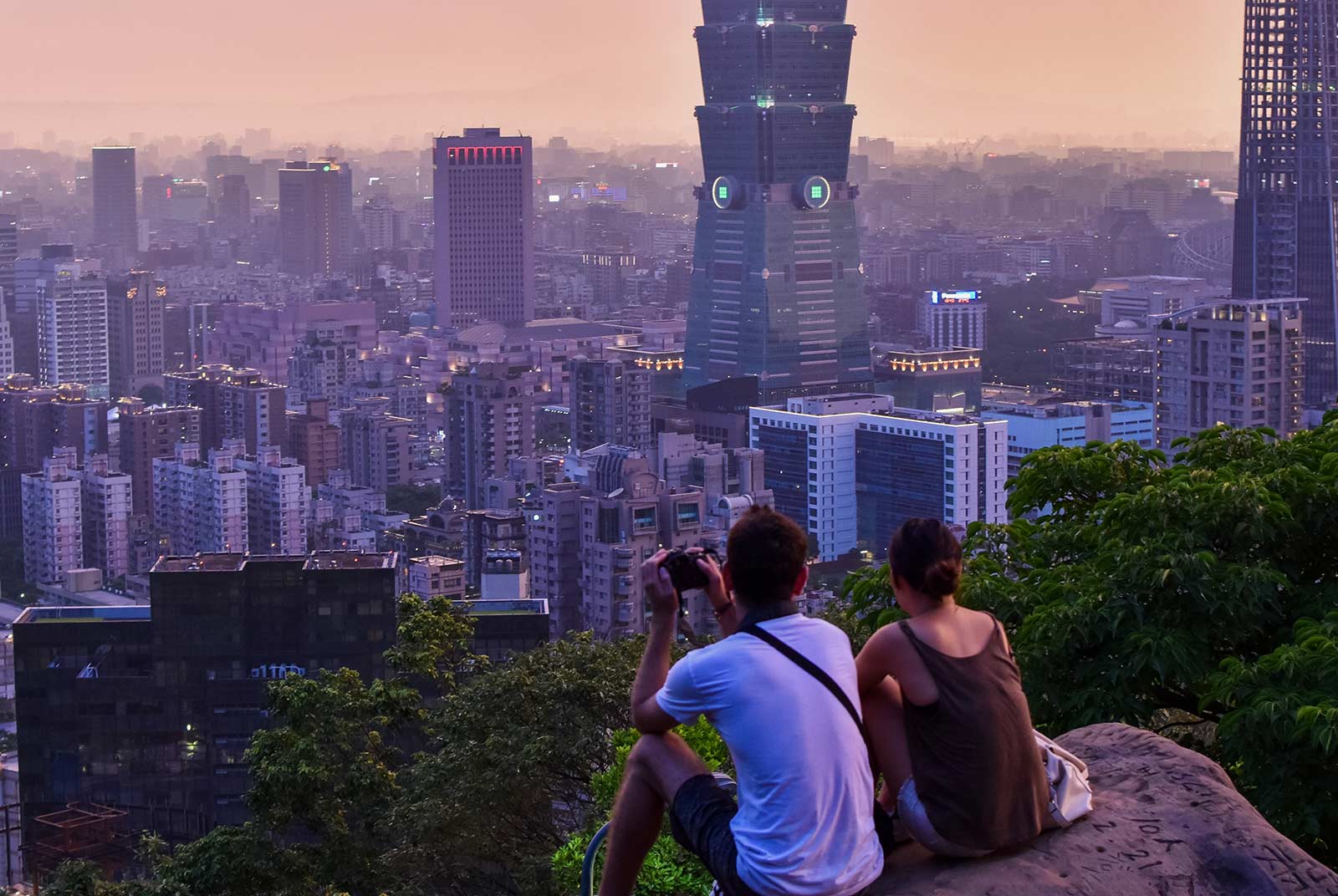Taiwan's Bicycling Craze:
Life in the Slow Lane
What is so appealing about bicycling that even corporate managers found bike teams and encourage employees to join challenging cycling tours around Taiwan?
Views
Life in the Slow Lane
By Chao-Yen LuFrom CommonWealth Magazine (vol. 402 )
While industries across the field are caught in a recession, the bicycle industry is enjoying an unprecedented boom.
Taiwan's bicycling population stood at 650,000 last year and is expected to grow to 1 million this year, according to statistics from the island's No. 1 bicycle brand Giant. During the first half of this year 150,000 bikes were sold, which already amounts to 65 percent of sales volume for all of 2007. At the same time, cyclists are moving upscale – sales of higher-end bicycles, with price tags upwards of NT$20,000, doubled this year from last.
"The bicycle industry doesn't face the problem of a recessive economy at all," says John Ho, president for domestic marketing at Giant Manufacturing. The cycling craze sweeping across Taiwan is irresistible. "In M-shaped societies the middle class and above are truly crazy about cycling!" says Ho in analyzing this new lifestyle trend.
Faced with swelling numbers of bicycle-loving citizens, even local government leaders feel compelled to make the establishment of bicycle lanes and bikeways a priority issue.
Indeed, the number of kilometers of new bike lanes built has become a benchmark of government performance. The greater Taipei area presently has some 300 kilometers of dedicated bike lanes, so that cyclists can pedal from downtown Taipei to Fishermen's Wharf in Danshui on the coast without having to worry about the capital's crowded road traffic. Meanwhile, many people who work in the Neihu Technology Park along the banks of the Keelung River in eastern Taipei ride their bicycles to work.
And countryside bike lanes across the island draw droves of urban office workers for relaxing holidays riding their mechanical steeds.
Hualian City on Taiwan's east coast replaced a four-kilometer stretch of old railway track with bike lanes to link its Nanbin Park and Beibin Park. The new bikeway offers an ideal vantage over the Pacific Ocean. Taichung County for its part has established the 12-kilometer Dongfeng Bikeway Green Corridor along an old rail line that was abandoned after the devastating Jiji earthquake of Sept. 21, 1999. With its lush greenery the tree-lined bikeway naturally blends with the surroundings of the nearby Dajia River.
What is it that makes cycling so attractive to Taiwan's middle class?
Recharging Batteries, Regaining Direction
Film director Chen Huai-en, whose 2007 movie "Island Etude" set off a craze around Taiwan for biking around Taiwan, has his own explanation for the new passion. "Over the past eight years, the Taiwanese were in pretty low spirits!" he says in diagnosing the public sentiment. During that period white collar workers had to face not only an economic downturn, but also manifold changes due to globalization and the rise of China. Yet they were trapped on an island with slowing economic growth. As a result, many people felt helpless in their hearts and minds, Chen elaborates.
Against this backdrop the bicycle became a means for the middle class to recharge their batteries, and cycling tours provided a brief sense of achievement.
At 5:30 a.m. while the city of Taipei is still fast asleep, Steven Cheng, manager of Hewlett-Packard Taiwan's Imaging and Printing Group, is already riding his mid-range bike, savoring the joy of freely racing through a city that will soon be congested. When Cheng enters his office at 7:30 a.m. he is bursting with energy. "I'm in good spirits for the whole day," Chen asserts. These days more and more people are riding their bicycles to work.
Giving It All to Complete a Tour
Jumping on the bandwagon of growing cycling enthusiasm, more and more companies are encouraging their staff to ride bikes. To cite an example, in September last year Wistron Corporation, the world's largest ODM manufacturer of information and communication technology products, had almost 30 employees take on the challenge of an eight-day round Taiwan cycling tour. Those who managed to complete the trip won a Giant M1 bicycle worth NT$14,000. This clearly set goal and the fact that each cyclist represented the entire company incited ambition and a sense of honor among team members, so that no one would give up.
Determination is most crucial for successfully completing a round-Taiwan bike tour. It is also a core character trait for achieving corporate success. The Wistron employees who joined the cycling team had to take written and oral exams. They were not only tested on basic route knowledge, but the interview committee members scrutinized with greatest intensity the cyclists' will to participate.
Philips Tsai, senior director of Wistron's Value Creation Center, initiated the round-Taiwan tour and also sat on the interview committee. "Determination is most important," he believes, given that the team members had virtually no prior experience with long-distance tours. Before the team departed, the members had to pass a test cycling uphill for 4.5 kilometers.
In the course of the arduous training, one employee jokingly said he was joining the round-Taiwan tour aware that it might become his last farewell to his wife. Tsai observes that today's employees "need to work hard, so they also need to play hard." He is confident that the spirit of personally conquering the challenge of the bike tour will reflect in employees' work performance.
Burdened with a heavy workload, Wistron Account Management Division specialist Tina Y.T. Kuo, who also heads the company's cycling club, even worked overtime until 4 a.m. on the day of the team's departure. When the soft-spoken Kuo fell off her bike during the tour and had to be hospitalized for an arm injury, she broke into tears because she could not complete the trip.
But the accident did not diminish the encouragement she drew from the overall experience. "After returning from the round-Taiwan tour, I felt that I could achieve even greater breakthroughs at work. Before, I used to think I was doing more than others, but now I definitely want to accomplish even more."
In the long term, the experience of cooperating across company divisions and departments in the Wistron cycling team will also benefit horizontal communication within the company.
Life at a Bike's Pace
You can race on a bike, but you can also leisurely pedal along. Chang Hsin-wen, lecturer at the Department of Leisure and Recreation Management at Chung Hua University, observes that in our fast-paced times people turn to the bicycle as a means of transportation in order to deliberately slow down.
"In the past, motorcycles were all about speed. Now, it's the era of living in the slow lane, at a bike's pace," notes Chang, who seven years ago launched a research project on bicycle tourism.
Because the bicycle allows for a slower pace, white-collar workers have come to use it as a way to slow down and mend family relations that have suffered due to a hectic lifestyle.
Ocean Butterfly Music managing director Eric Lin has written the lyrics for many classic Taiwanese pop songs such as "Listen to the Sea" or "Cut Love." Over the past five or six years, he traveled abroad a lot for business, never spending more than three or four days a month in Taiwan with his family. Today, he regrets that he has missed out on spending precious childhood time with his two sons, who grew into teenagers while he was away.
Lin turned to cycling with his family to reconnect with his sons and rebuild family ties. Over the past two decades Lin has bought 19 cars. If nowadays he uses the family's only car, it is to take them and their bikes to their cycling destinations. Meanwhile, Lin has 11 bicycles hanging on the walls of his home. Lin now takes advantage of every holiday to take the whole family on bike tours. His elder son Yu-kuo, who will soon start his last year in senior high school, still recalls how boring family outings were for him in the past. "Before, we used to go on excursions by car, and I would always fall asleep in the car." As a result, such trips did not do much to improve communication and interaction among family members.
Thanks to their cycling tours together, the Lin family now has something to talk about and also pleasant memories to share. Lin's second son Yu-tang, who is in his second year of junior high school, recalls how the entire family in March traveled to Hualian for a bike tour, enjoying sightings of frogs and butterflies and the drizzling spring rain. Yu-tang, who is not much into sports, admits with a shy smile, "Riding the bike felt really good."
From their two-wheeled trips, the two boys have brought back many unforgettable memories. They remember cycling through the small alleys of the ancient harbor town of Lugang, seeing women in Beigang press sesame oil by hand, and visiting the Suantou Sugar Mill in Jiayi County. For city kids, these were eye-opening experiences.
On the other hand the family bike tours also give the teenage boys an opportunity to develop their independence.
"When we cycle on roads, they need to pay attention to road conditions and respond immediately. They also need to learn to be responsible, to ride their bikes home. They can't give up just because they're tired," says Lin in explaining the educational benefit of bike tours.
At dusk the Lin family usually rides their bikes along the river banks, Lin taking the lead, the two boys following and his wife bringing up the rear. "When we are cycling we are together as a family, but we also maintain our personal independence," says Lin.
Making Friends through Cycling
Cycling not only helps to hold the family together, but also brings some personal warmth to the rather standoffish middle class. For office workers, who are often too busy to socialize, cycling is an activity that makes it easier to reach out to others.
Bike Lin, deputy head of the Cycling Life-Style Foundation, has been cycling for 30 years and has met most of his friends in the cycling community. Lin rides his bike from downtown Taipei to Danshui in the morning and back home in the evening every day.
"I met 80 percent of my friends and even my wife through cycling," he declares. As Lin relates his cycling experiences, he keeps waving at oncoming bikers, strangers that he meets on the bikeway every day.
Cycling enthusiasts like to claim, "Those who ride bikes are good people." If a cyclist comes across someone with a broken bike, he will get off and help him repair it. Unexpectedly, the bicycle has become a means for urbanites to rebuild goodwill and mutual trust.
The Big Apple Team, Taiwan's largest group of bicycle enthusiasts, also uses cycling events for volunteer activities. Two years ago team founder and leader Cheng Chi-yuan left his job in an insurance firm to devote himself fulltime to managing the Big Apple Team. The common interest of cycling brings together people from different walks of life whose paths would probably not cross otherwise.
"I often get phone calls from management-rank team members who ask me how they can help," Cheng says happily. In early July the team's coach took 13 junior high school students of the Mustard Seed Mission's children's home in Sinjhuang on a free seven-day bike tour of northern Taiwan.
Translated from the Chinese by Susanne Ganz






